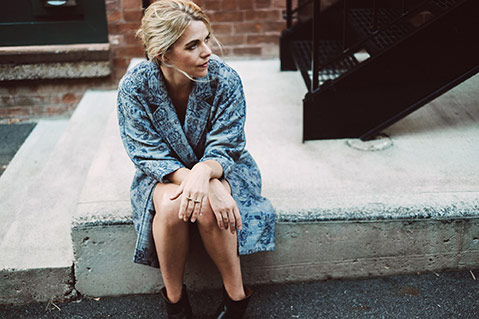Aoife O’Donovan Talks Music and Muses
Singer/Songwriter Makes a Tour Stop in S.B.

“There’s something about those days, the escape of going to Ireland every summer,” said Boston-raised singer/songwriter Aoife O’Donovan. “It was a much simpler place, and it was just very special to go there and be completely free as a child.” The Emerald Isle and the sweet innocence of childhood are themes that resonate heavily in her latest record, In the Magic Hour. The result is an enchanting compendium of tunes that explore life and death and “youth as sort of an untouched time,” she explained. I spoke over the phone with O’Donovan from her home in Brooklyn about her approach to In the Magic Hour and music’s limitless permutations.
How did this record come about? It was kind of time for me to make my next record. I had Fossils that came out in 2013, and the average time is about two years [between records]. I had been pretty diligent about trying to write during the two years that I spent on the road promoting Fossils, but I didn’t have a full record written, and I still had a bunch of songs I had to write, and I was sort of thinking about solitude and the life cycle in general, and then my granddad passed away at the very ripe old age of 93, so it sort of helped finish a bunch of songs. Some were written directly about him, his beauty and his simple life, and some just sort of helped me figure out the arc of the album and really having it be sort of a meditation on the life cycle, and sort of on magical elements of childhood, mixed in with the magical unknown of what happens after you die.
Is “Magic Hour” specifically one of those? “Magic Hour” is specifically. I’m so happy that that song has been reaching people because for me it’s a very personal moment. But it’s all very metaphorical … when you’re running around on the beach and there’s, like, fairy children and there’s magic, but you’re singing it from the perspective of an adult. You’re lamenting the loss of your childhood.
As a listener, it’s delightful to hear music that’s inventive and to find artists like yourself who can tweak it to make it feel like a new experience. Is that intentional? It probably is subliminally intentional, at some point, to try to throw some tricks in there. But it’s also about how you hear melody. Like you might be able to discover that your sound can go in an entirely new direction just by changing one thing … I think that’s the amazing thing about music, that you can have limitless possibilities, permutations of chords, harmonic structure, the melody. Even just the voicing of a chord can make it sound completely different.
“Stanley Park” begins so delicately with just the guitar, and then it builds. I thought that was such a great entrée into the album. That song is also a very intense song, to me, because it feels very lonely. It feels very nostalgic, and it kind of goes back to the life cycle thing, seeing a bird … and then the second verse, seeing a baby, and wanting to sort of crawl back, to get back to before you were born. And then at the end, when I die, bring me back as a seagull; “I’ll make my tracks on the sandy beach.” And in the middle of the song, it’s like you’re wandering and trying to get out of whatever situation you’re in, trying to break the glass, and you finally break the glass and you pretend you’re Superman. It’s very sad.
You studied music at the New England Conservatory, yes? I learned a ton of stuff there. It’s a really great program that I did. It was a lot about developing your personal style, and figuring out what your voice is and who you want to be as a musician, an artist. I think young people should be encouraged to study music. You know, it’s a great path to go down.
4.1.1
Sings Like Hell presents Aoife O’Donovan Friday, February 26, at 8 p.m. at the Lobero Theatre (33 E. Canon Perdido St.). For tickets, call (805) 963-0761 or see lobero.com.



